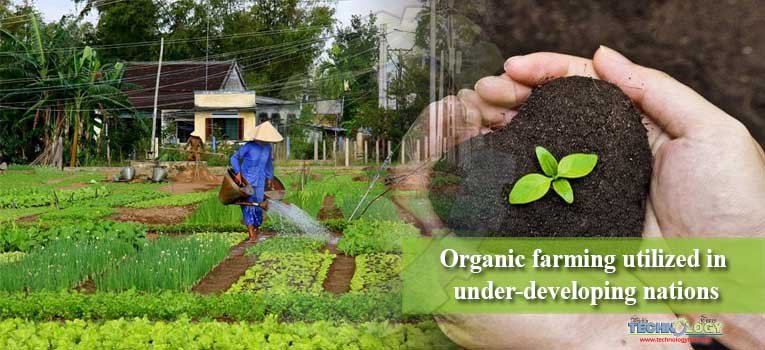Organic farming is a technique for harvest and domesticated animal production that includes no use of pesticides, fertilizers, genetically modified organisms, antibiotics and growth hormones.
 Organic farming techniques are generally utilized in under-developing nations, to a great extent as a result of economics and an absence of synthetic chemical compounds. Be that as it may, they are winding up more generally acknowledged in developed nations as a response or industrial facility conditions.
Organic farming techniques are generally utilized in under-developing nations, to a great extent as a result of economics and an absence of synthetic chemical compounds. Be that as it may, they are winding up more generally acknowledged in developed nations as a response or industrial facility conditions.
History
The concepts of organic agriculture were developed in the early 1900s by Sir Albert Howard, and others who believed that the use of animal, cover crops, crop rotation, and biologically based pest controls resulted in a better farming system.
The Green revolution technology prompted increment in sustenance grains production, but has made more requests on water, fertilizer and man power or machinery use. Intensive cropping resulted in deteriorating soil tilth and decreased organic matter content.
High level of chemical inputs is increasing pollution hazard and result further degradation of soil health. The expanded utilization of agro-chemicals is dirtying water and climate and in this manner impact on yield creation, and creature and ponder human health.
It depends on balanced agricultural practices such as using green manure, dung of animals, organic wastes, crop rotation, biopesticides etc. Organic farming utilizes pesticides and fertilizers if they are natural and avoids the use of chemicals.
International Federation of Organic Agriculture Movements (IFOAM), an international organization established in 1972 for organic farming organizations defines goal of organic farming as:
“Organic agriculture is a production system that sustains the health of soils, ecosystems and people. It relies on ecological processes, biodiversity and cycles adapted to local conditions, rather than the use of inputs with adverse effects. Organic agriculture combines tradition, innovation and science to benefit the shared environment and promote fair relationships and a good quality of life for all involved…”
Differences Between Organic and Conventional Farming Methods
In conventional farming/cultivating technique, before seeds are planted, the farmer should treat or disinfect his homestead utilizing brutal synthetic substances to eliminate any normally existing fungicides. He will prepare the soil by utilizing petroleum-based fertilizers.
On the other side, the natural farmer will plan and advance his territory before planting by sprinkling normal based composts, for example, green manure, bone meal or shellfish manure.
Organic Farming not Adopted on Large Scale because;
- Chemical are easy to use and cheap.
- The benefit of organic practices is not seen immediately.
- Large amount of organic inputs is required.
- Difficult to get organic fertilizer.
- No preference to consume organic food is established.
- Economic loss to transition (from traditional agriculture to organic agriculture).
- No experimental evidence on the cost benefit ratio of organic farming.
- Government effort to propagate.
- Scientific research is also scare.
Reasons for Organic Farming
- To utilize the benefits of nutrients.
- Avoid GMOs.
- Natural and better taste.
- Direct support to farming.
- To conserve agricultural diversity.
- To prevent antibiotics, drugs, and hormones in animal products.
Features of Organic Farming
- Protecting soil texture and structure using organic manures and enhancing biological activity.
- Indirect provision of crop nutrients using soil microorganisms.
- Nitrogen fixation in soils using legume crops.
- Weed and pest control based on methods like crop rotation, biological diversity, natural predators, organic manures.
- Rearing of livestock, taking care of housing, nutrition, health, rearing and breeding.
- Care for the larger environment and conservation of natural habitats and wildlife.
Principles of Organic Farming
- Principle of Health: Organic agriculture contribute to the health and well-being of soil, plants, animals, humans and the earth.
- Principle of Fairness: Fairness in maintaining equity and justice of the shared planet both among humans and other living beings.
- Principle of Ecological Balance: Organic farming must be modeled on living ecological systems.
- Principle of Care: Organic agriculture should be practiced in a careful and responsible manner to benefit the present and future generations and the environment.
Advantages of Organic Farming
- Organic manures produce high yields and good quality crops.
- They supply the nutrients required by the plant e.g. NPK.
- They improve plant development, metabolic and physiological activities of plants.
- They improve the soil physical properties such giving good aeration, easy rot penetration and improved water holding capacity.
- They improve the soil chemical properties such as supply and retention of soil nutrient and promote favorable chemical reaction.
- Most of the organic manures are wastes of byproduct which accumulate pollution.
- Organic fertilizer is a complete plant food.
- Organically grown crop are believed to provide healthier and nationally superior food for man and animals that those grown with commercial fertilizers.
- Organically grown plants are more resistant to disease and insect.